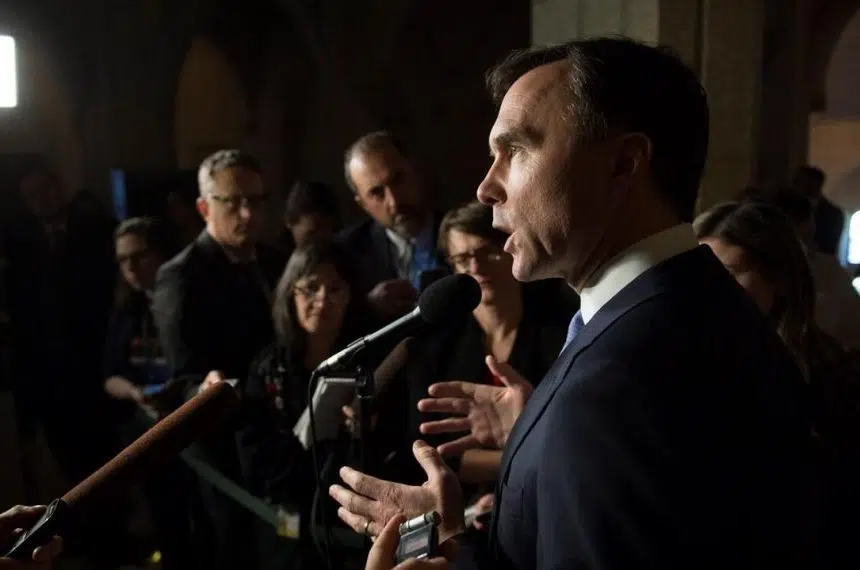OTTAWA — The federal government released more details Wednesday on changes to its controversial tax proposals in hopes of further addressing deep concerns over reforms that have angered the small-business community.
The Liberals are tweaking a proposal that, as of Jan. 1, would tighten existing rules enabling small-business owners to lower their tax burden by distributing earnings among family members who do not make significant contributions to their companies — a practice known as income sprinkling.
The changes are among several adjustments the government made to its overall tax-reform package following an onslaught of complaints from doctors, lawyers, accountants, tax experts, farmers, premiers and even some Liberal backbenchers.
Critics have denounced the proposals, contending they would hurt the very middle class the Trudeau government claimed to be trying to help.
Earlier Wednesday, the Senate finance committee urged the government to abandon its controversial tax proposals — or at the very least delay their implementation for one year, until 2019.
The committee — five Conservatives, five independents and two Independent Liberals — made the demand after studying the potential impacts of the entire package of proposals. Two senators on the committee, both of whom were appointed by Prime Minister Justin Trudeau, declined to support the call for the whole tax plan to be withdrawn.
The government insisted that Wednesday’s revisions, this time to the income-sprinkling rules, contain clear tests to determine whether a relative has made a meaningful contribution to — or investment in — the family business.
The Finance Department said businesses will have until Dec. 31, 2018, to adjust to the changes, which include new qualification rules for family members — such as substantial capital investments as well as minimums for age and the number of hours worked.
On Wednesday, Trudeau said the modified income-sprinkling proposal would only have an impact on three per cent of all small businesses in Canada — and even those affected would still be able to continue sprinkling their income, as long as it’s for legitimate reasons.
The Liberals vowed to simplify the income-sprinkling proposal amid concerns about the added complexity of trying to prove the involvement of family members.
The government says family members who make meaningful contributions to a company will not be affected by the updated rules. Here are some examples of those who would be exempt:
— A business owner’s spouse, as long as the owner meaningfully contributed to the company and is aged 65 and older.
— Adults aged 18 and older who have made labour contributions of at least 20 hours per week or about 1,000 hours per year.
— Adults aged 25 and older who own at least 10 per cent of a company that earns less that 90 per cent of its income from providing services and is not a professional corporation.
Initially, the government expected the change to bring in another $250 million per year to federal coffers, but that’s been revised to $220 million per year by 2022-23.
A coalition of industry associations, including a national group representing small- and medium-sized businesses, has criticized Ottawa for waiting until a couple of weeks before the end of the year to provide clarity on the tax changes, which will take effect on Jan. 1, 2018.
The political and business-sector backlash over Morneau’s suite of tax proposals, which he released in the middle of the summer, dogged the finance minister for months. Wednesday’s Senate recommendations added to the pressure, but Conservative Sen. Percy Mockler insisted the report was not meant to embarrass the government, nor as a partisan attack.
The criticism in recent months has forced Morneau to eventually back away from some elements of the package.
In hope of soothing its critics, the government announced in October it would abandon an element of the income-sprinkling proposal that would have limited access to the lifetime capital gains exemption. Morneau said he made the change to avoid unintended negative impacts on the intergenerational transfer of family businesses, like farms.
Morneau also announced several other adjustments to the overall plan.
He narrowed the scope of his proposal on passive-investment income — what some believe is the most contentious piece of the government’s tax-reform plan — so that only about three per cent of the most wealthy private corporations will have to pay higher taxes.
The adjustment to the original proposal will create a threshold of $50,000 on passive income per year. The change followed a flood of complaints that warned cracking down on passive investments could hurt middle-class entrepreneurs who use their companies to save for economic downturns, personal leaves and retirement.
Morneau said the goal of the change was to enable small business owners to sock away money inside their corporations for future business-related needs, while still targeting wealthy people who use their corporate structures purely as a way to reduce their taxes.
The government will release draft legislation as part of next year’s budget.
Morneau also announced he would no longer move forward with a tax proposal related to converting income into capital gains. The proposal raised concerns about negative tax implications, particularly among those in the agricultural community who hope to pass their family businesses to the next generation.
After last fall’s outcry, the government also announced it would revive a 2015 campaign promise to cut taxes for small businesses. Trudeau promised to gradually trim the small-business tax rate to nine per cent by 2019, down from its current level of 10.5 per cent.
Andy Blatchford and Mia Rabson, The Canadian Press







